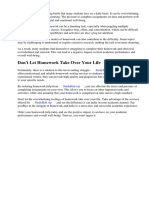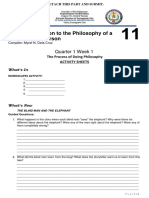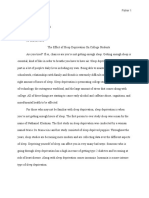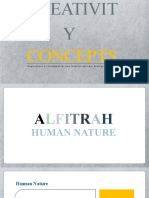How To Write A Reflective Journal With Tips and Example
Uploaded by
DOUGLAS ANAK RUNDANG STUDENTHow To Write A Reflective Journal With Tips and Example
Uploaded by
DOUGLAS ANAK RUNDANG STUDENTHow to Write a Reflective Journal with Tips and Examples
窗体顶端
窗体底端
What is a Reflective Journal?
A reflective journal is a place to write down your daily reflection entries. It can be something good
or bad that has happened to you that you can self-reflect on and learn from past experiences.
A reflective journal can help you to identify important learning events that had happened in your
life. The events include your relationships, careers and personal life. By writing a reflective diary,
you can find the source of your inspiration that defines you today. A reflective journal also provides
a better understanding of your thought process.
Reasons to Write a Reflective Journal
1. To understand the things that have happened.
2. To reflect on why it happened this way.
3. To align future actions with your values and lessons learned from your past experiences.
4. To share and get your thoughts and ideas out of your head.
窗体顶端
窗体底端
How to Reflect Effectively
According to Schön, there are two types of reflection, one during and one after an activity or event.
Reflection In-Action
When you are thinking about or reflecting while you are in an activity, you are using reflection in-
action. Some reflection include:
Experiencing
Thinking on your feet
Thinking about what to do next
Acting straight away
Reflection On-Action
You can do reflect-on-action once the activity has finished based on what you can remember about
it. Step back into the experience, explore your memory and retrieve what you can recall. Reflect and
understand what has happened and draw lessons from the experience.
Thinking about something that has happened
Thinking what you would do differently next time
Taking your time
Examples to Reflect Effectively
Before the Experience
Think about the things that could have happened.
What are the things that you feel might be a challenge?
The things that you can do to prepare for these experiences.
During the Experience
Observe what is happening at the moment, as you make a particular decision.
Is it working out as expected? Are you dealing with the challenges well?
Is there anything you should do, say or think to make the experience successful?
After the Experience
Describe your thoughts immediately after, and/or later when you have more emotional
distance from the event.
Is there anything you would do differently before or during a similar event?
What are the takeaways from this experience/lesson?
窗体顶端
窗体底端
How to Write Reflectively
Use the three “W”s to write reflectively. The three “W”s are What, So What and What next.
What (Description)
Recall an event and write it down descriptively.
What happened?
Who was involved?
So what? (Interpretation)
Take a few minutes to reflect and interpret the event.
What is most important / interesting / relevant / useful aspect of the event, idea or situation?
How can it be explained?
How is it similar to/different from others?
What’s next? (Outcome)
Conclude what you can learn from the event and how you can apply it next time.
What have I learned?
How can it be applied in the future?
Reflective Journal Prompts
Here are the 10 writing prompts to guide you in self-reflection and self-discovery.
1. What makes you unique?
2. Name someone that means a lot to you and why?
3. Write a letter to your younger self.
4. What is something you can do to focus more on your health and well-being?
5. What makes you feel at peace?
6. List 10 things that make you smile.
7. What does it mean to live authentically?
8. What is your favourite animal, and why?
9. How do you maintain your physical/mental health? What can you do to improve the
methods of recovery?
10. List the things that you want to achieve this week.
You might also like
- Facilitating Reflection: A Manual For Leaders and Educators100% (1)Facilitating Reflection: A Manual For Leaders and Educators51 pages
- Cognitive Behaviour Therapy For Older Adults WithNo ratings yetCognitive Behaviour Therapy For Older Adults With13 pages
- High Performance Masterclass Series - Part 1: Session 1 WorksheetNo ratings yetHigh Performance Masterclass Series - Part 1: Session 1 Worksheet1 page
- 33 Journaling Ideas - What To Write About in A Daily JournalNo ratings yet33 Journaling Ideas - What To Write About in A Daily Journal20 pages
- 99 Thought Provoking Journal Prompts For Depression and AnxietyNo ratings yet99 Thought Provoking Journal Prompts For Depression and Anxiety6 pages
- What Is Emotional Intelligence?: 1. Self-AwarenessNo ratings yetWhat Is Emotional Intelligence?: 1. Self-Awareness5 pages
- q1 - w1 - Activity Sheets - Introduction To Philosophy-AnswersheetsNo ratings yetq1 - w1 - Activity Sheets - Introduction To Philosophy-Answersheets4 pages
- Morgan Fisher - Sleep Deprivation Research-3No ratings yetMorgan Fisher - Sleep Deprivation Research-311 pages
- Tiny Self-Care Ideas For The Mind: Five Minutes of "Play"No ratings yetTiny Self-Care Ideas For The Mind: Five Minutes of "Play"3 pages
- Quarter 1 - Module 1: Knowing Oneself: Rizal College of TaalNo ratings yetQuarter 1 - Module 1: Knowing Oneself: Rizal College of Taal26 pages
- How To Write A Reflective Journal With Tips and ExamplesNo ratings yetHow To Write A Reflective Journal With Tips and Examples4 pages
- What Is The Purpose of Reflective Writing?No ratings yetWhat Is The Purpose of Reflective Writing?3 pages
- Over 200 Journal Writing Prompts and Ideas for Better Mental Health, Creativity, and Self-Discovery: The Journaling HandbookFrom EverandOver 200 Journal Writing Prompts and Ideas for Better Mental Health, Creativity, and Self-Discovery: The Journaling Handbook5/5 (1)
- Ncert Solutions For Class 6 English 2may Unit 7 The Wonder Called SleepNo ratings yetNcert Solutions For Class 6 English 2may Unit 7 The Wonder Called Sleep2 pages
- Creative Thinking Concept, Definitions and Islamic PerspectiveNo ratings yetCreative Thinking Concept, Definitions and Islamic Perspective36 pages
- Positive Affirmations (Rachel Robins) (Z-Library)100% (1)Positive Affirmations (Rachel Robins) (Z-Library)84 pages
- Chapter One: Introduction To Research MethodologyNo ratings yetChapter One: Introduction To Research Methodology7 pages
- The Human Good and The Function ArgumentNo ratings yetThe Human Good and The Function Argument2 pages
- GES 106 TEST - PHILOSOPHY, LOGIC AND CRITICAL THINKING New OneNo ratings yetGES 106 TEST - PHILOSOPHY, LOGIC AND CRITICAL THINKING New One14 pages
- Dokumen - Tips The Ultimate Guide To Myers Briggs Making Business Matter The Ultimate Mbti PersonalityNo ratings yetDokumen - Tips The Ultimate Guide To Myers Briggs Making Business Matter The Ultimate Mbti Personality1 page
- Book Review Abc Philosophy Knows How To Think Forward For Yourself and The WorldNo ratings yetBook Review Abc Philosophy Knows How To Think Forward For Yourself and The World2 pages
- Negotiation 7th Edition Lewicki Solutions Manual Download100% (21)Negotiation 7th Edition Lewicki Solutions Manual Download9 pages
- Module 1 - Concept and Nature of Self: Who Am I?No ratings yetModule 1 - Concept and Nature of Self: Who Am I?8 pages
- The Problem of Schematism in Kant and Its Transformation in Southwest Neo-Kantianism.No ratings yetThe Problem of Schematism in Kant and Its Transformation in Southwest Neo-Kantianism.35 pages
- Chapter 3 - Consciousness, Identity, and The Self-1No ratings yetChapter 3 - Consciousness, Identity, and The Self-117 pages
- (Harris Meltzer Trust Series) Roger Money-Kyrle, Meg Harris Williams - Man's Picture of His World and Three Papers-Karnac Books (2015)No ratings yet(Harris Meltzer Trust Series) Roger Money-Kyrle, Meg Harris Williams - Man's Picture of His World and Three Papers-Karnac Books (2015)289 pages
- Chapter 04 The Self, Identity, Emotion, and Personality - Version1No ratings yetChapter 04 The Self, Identity, Emotion, and Personality - Version171 pages
- Facilitating Reflection: A Manual For Leaders and EducatorsFacilitating Reflection: A Manual For Leaders and Educators
- High Performance Masterclass Series - Part 1: Session 1 WorksheetHigh Performance Masterclass Series - Part 1: Session 1 Worksheet
- 33 Journaling Ideas - What To Write About in A Daily Journal33 Journaling Ideas - What To Write About in A Daily Journal
- 99 Thought Provoking Journal Prompts For Depression and Anxiety99 Thought Provoking Journal Prompts For Depression and Anxiety
- What Is Emotional Intelligence?: 1. Self-AwarenessWhat Is Emotional Intelligence?: 1. Self-Awareness
- q1 - w1 - Activity Sheets - Introduction To Philosophy-Answersheetsq1 - w1 - Activity Sheets - Introduction To Philosophy-Answersheets
- Tiny Self-Care Ideas For The Mind: Five Minutes of "Play"Tiny Self-Care Ideas For The Mind: Five Minutes of "Play"
- Quarter 1 - Module 1: Knowing Oneself: Rizal College of TaalQuarter 1 - Module 1: Knowing Oneself: Rizal College of Taal
- How To Write A Reflective Journal With Tips and ExamplesHow To Write A Reflective Journal With Tips and Examples
- Over 200 Journal Writing Prompts and Ideas for Better Mental Health, Creativity, and Self-Discovery: The Journaling HandbookFrom EverandOver 200 Journal Writing Prompts and Ideas for Better Mental Health, Creativity, and Self-Discovery: The Journaling Handbook
- Ncert Solutions For Class 6 English 2may Unit 7 The Wonder Called SleepNcert Solutions For Class 6 English 2may Unit 7 The Wonder Called Sleep
- Creative Thinking Concept, Definitions and Islamic PerspectiveCreative Thinking Concept, Definitions and Islamic Perspective
- GES 106 TEST - PHILOSOPHY, LOGIC AND CRITICAL THINKING New OneGES 106 TEST - PHILOSOPHY, LOGIC AND CRITICAL THINKING New One
- Dokumen - Tips The Ultimate Guide To Myers Briggs Making Business Matter The Ultimate Mbti PersonalityDokumen - Tips The Ultimate Guide To Myers Briggs Making Business Matter The Ultimate Mbti Personality
- Book Review Abc Philosophy Knows How To Think Forward For Yourself and The WorldBook Review Abc Philosophy Knows How To Think Forward For Yourself and The World
- Negotiation 7th Edition Lewicki Solutions Manual DownloadNegotiation 7th Edition Lewicki Solutions Manual Download
- The Problem of Schematism in Kant and Its Transformation in Southwest Neo-Kantianism.The Problem of Schematism in Kant and Its Transformation in Southwest Neo-Kantianism.
- Chapter 3 - Consciousness, Identity, and The Self-1Chapter 3 - Consciousness, Identity, and The Self-1
- (Harris Meltzer Trust Series) Roger Money-Kyrle, Meg Harris Williams - Man's Picture of His World and Three Papers-Karnac Books (2015)(Harris Meltzer Trust Series) Roger Money-Kyrle, Meg Harris Williams - Man's Picture of His World and Three Papers-Karnac Books (2015)
- Chapter 04 The Self, Identity, Emotion, and Personality - Version1Chapter 04 The Self, Identity, Emotion, and Personality - Version1

























































































